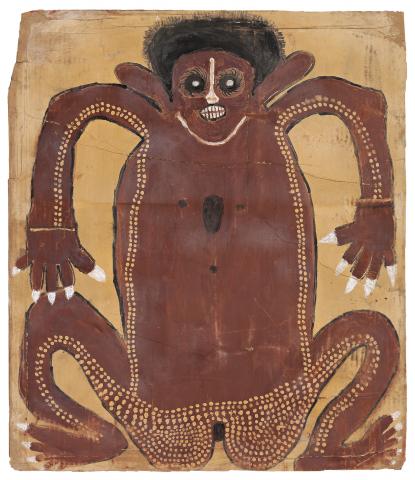ARKULA SPIRIT BEING, 1970
CHARLIE NUMBULMOORE
natural earth pigments on cardboard
73.0 x 63.0 cm
Painted at Gibb River Station, West Kimberley, Western Australia
Tom McCourt, South Australia
Private collection, South Australia
Sotheby's, Melbourne, 9 July 2001, lot 7 (label attached verso)
Collection of the late Duncan Kentish, Adelaide
Purchased by South Australian pastoralist Tom McCourt, during a memorable field trip to the Kimberley in 1971, this painting represents one of several made by Charlie Numblemore and bought by McCourt. Notably, Charlie was referred to as 'Numbulbor' by McCourt and also considered by him to belong to the Gidji [Kija] speaking people of south central Kimberley. However, it is now understood that the artist was of the Wurla language group, an eastern branch of the Ngarinyin-speaking peoples of the central Kimberley.
During the 1960s, Charlie worked closely with anthropologist Ian Crawford who recorded him repainting wanjina images in Mamadai cave and collected a significant number of his works, many executed on sheets of brown paper. In particular, Crawford provides a detailed account of Charlie’s approach to the reworking of these important images, and outlines techniques he used.1 Works by Charlie were also commissioned by Helen Groger-Wurm on behalf of the then Australian Institute of Aboriginal Studies in 1970. These paintings now form part of the National Estate.2
McCourt spent some time with Charlie Numbulmore and his collection of the artist’s work remained for a long time the largest collection held privately. Significantly, it represents the final works undertaken by Charlie.
Described in his book, Aboriginal Artefacts, as one of a number of paintings on cardboard, stored in Charlie's hut at Gibb River, McCourt notes that it is a painting of ‘A 'devil-devil' in brown and black, with claws on its fingers.’ 3
There are a wide variety of spirit beings, generically known as jimi, inhabiting the world of the people of the north Kimberley - some are benevolent and play an important role in ensuring there will be a regular supply of bush tucker including wild honey or sugarbag. Others however, are malevolent and very dangerous. Exaggerated ears and the pronounced claws or talons identify the subject of this picture as an evil sprite or spirit being. It may represent either an arkula - an evil aspect of the spirit of a dead person or, as the subject appears to be female, it may depict Jilinya, a fearsome female spirit who inhabits the bush and preys on humans.4
1. Crawford, I. M., The Art of the Wanjina: Aboriginal Cave Paintings in Kimberley, Western Australia, Oxford University Press, London, 1968, pp.25-27
2. Ryan, J. with Akerman, K. (eds), Images of Power: Aboriginal Art from the Kimberley, National Gallery of Victoria, Melbourne, 1993, pp.20-21
3. McCourt, T., Aboriginal Artefacts, Rigby, Adelaide, 1975
4. For more details of these spirit beings see: Akerman, K., Wanjina: Notes on Some Iconic Ancestral Beings of the North Kimberley, Hesperian Press, Western Australia, 2016, pp.145-170
KIM AKERMAN
